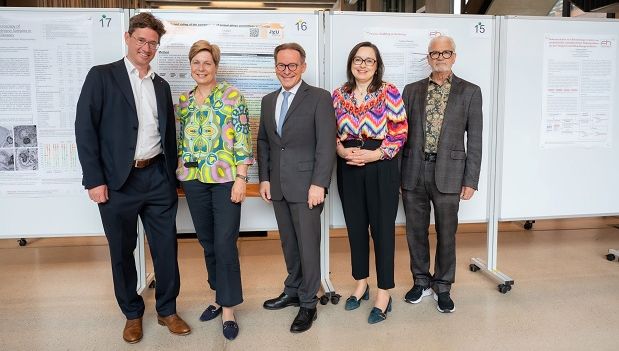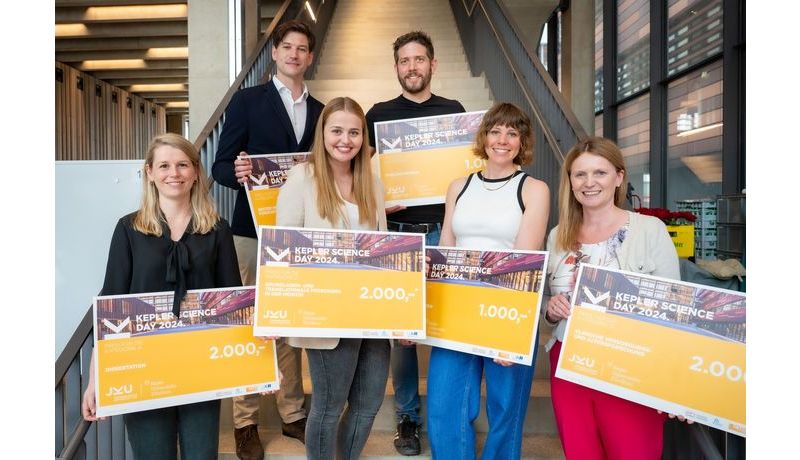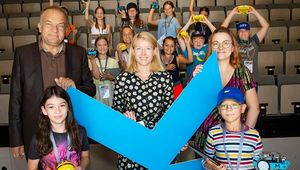Discovering what medicine can do: The 8th Annual Kepler Science Day featured innovative research projects.

Various presentations during the 8th Annual Kepler Science Day focused on medical technology, the use of AI in medicine, and base-knowledge research, spurring particularly interesting clinical studies and lively discussions.
Kepler Science Day is not only a public discussion platform designed to inspire and spark an interest in research, but also about making connections and building scientific networks and relationships.
Consciously designed as a cross-organizational and inter-university event to maximize research potential in Upper Austria, on May 16, 2024, the JKU Faculty of Medicine), the Kepler University Hospital (KUK), the University of Applied Sciences Upper Austria (FH OÖ), the University of Applied Sciences Health Professions Upper Austria (FHG OÖ), Upper Austrian Research (UAR), and the Medical Technology Cluster (within the Business Upper Austria) organized and hosted the eighth annual Kepler Science Day.
Over 120 visitors attended some of the interdisciplinary presentations (19 in total) and poster presentations (40 in total) showcasing new findings in AI, medical technology, clinical care, and ageing research. The Kepler Science Day promotes research projects that feature a strong interdisciplinary approach.
Awards were presented as part of the symposium, designed to recognize outstanding research accomplishments and ideas in the following key research areas:
- Category 1: Medical Technology and AI in Medicine:
Computer-Aided Claudin-18.2 Assessment in Gastric Cancer, Mag. Sabina Köfler, MSc - Category 2: Fundamental and Translational Research in Medicine: Upcycling of Medical Waste to Treat Osteoarthritis, Sophie Carolin Döttl
- Category 3: Clinical Research and Ageing Research:
Prediction of Survival after Neoadjuvant Therapy in Locally Advanced Rectal Cancer, OÄ Dr. Gudrun Piringer - Category 4: Dissertations: IFNAR-JAK-STAT Signaling Induces Melanoma Cell-Intrinsic PD-1 and its Blockade Disrupts Immune Checkpoint Inhibitor Efficacy, Dr. Julia Holzgruber
Awards were presented in each category, such as for the best presentation (endowed with €2,000 in prize money), the best interdisciplinary research approach (endowed with €2,000 in prize money), and the best poster (endowed with €1,000). The winner of the audience award based on the popular vote received an additional €1,000 in prize money.
Presentation Rankings:
Best Interdisciplinary Research Approach: Dr. Philip Rauch
Presentation: Individualisierte Wachstumsprognose bei hirneigenen Tumoren
Audience Award: Dr. Christian Thome
Presentatkion: Exploring Axon-Carrying Dendrite Diversity in Mouse and Human Hippocampal Interneurons
In addition to selected academic presentations, there was an on-site poster session showcasing innovative projects. Assist. Dr. Maike Stegemann won the best poster award for her poster titled “Bispecific Antibody Activity Against Senescent Lymphoma Cells”.
Immense Interest during Kepler Science Day
Elgin Drda, Vice-Rector for Medicine and Dean at the JKU Faculty of Medicine, remarked: "This year, we are celebrating the JKU Faculty of Medicine’s 10th anniversary. I am particularly pleased that young researchers are very attracted to our annual Kepler Science Day. I am deeply impressed by the number of high-quality, innovative presentations and I would like to congratulate all of the award winners!"
Christine Haberlander, Deputy State Minister of Health, added her praise: "Medicine is becoming more complex and demanding and for the past ten years, the Linz Faculty of Medicine has been meeting this challenge extremely well. The relatively young Kepler Science Day is now a real flagship project, demonstrating our young researchers’ innovative power and creativity in a wide range of disciplines. We here in Upper Austria can be very proud indeed."
Univ. Prof. Dr. Andreas Gruber, Associate Dean for Research at the JKU Faculty of Medicine, had a positive take on the event: "Given the relatively new medical university in Linz, understanding science and research as an integral part of academic medicine - and by no means a peripheral element - is particularly important. The 8th Kepler Science Day attracted guest speakers in clinical medicine, translational research, basic sciences, medical technology, and nursing sciences, underlining both the growing importance of research in Linz and the extensive interdisciplinary and interprofessional partnerships now in place. The presentations and posters demonstrated a high level of academic excellence."
 Go to JKU Homepage
Go to JKU Homepage












